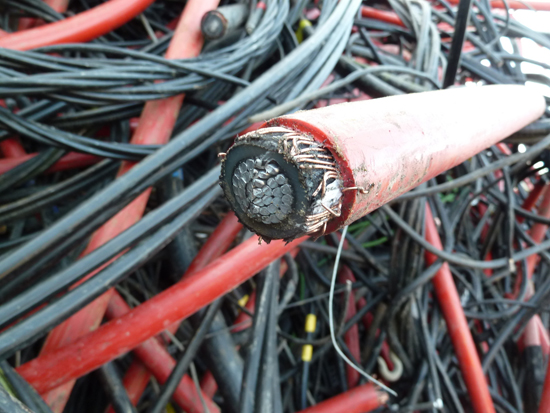
Illegal cables manufacturer busted by GSA
A team from the Ghana Standards Authority (GSA) and the Ghana Police Service yesterday raided a one-storey building in Accra that has been converted into a manufacturing site for the production and distribution of unapproved electrical cables and other products for sale in the country.
In the process, the team arrested two persons suspected to be Chinese who are believed to be the ringleaders of the fake cable manufacturing group. The suspects have been identified as Chen Yanshan and Su Lunyou.
The operation was led and supervised by the Director-General of the GSA, Professor Alex Dodoo.
Items retrieved
In the swift operation that lasted about two hours, the team retrieved about three truckloads of electrical cables and other electrical products, money in various currencies, including yen, British pounds and US dollars, and some medications.
Prof. Dodoo told the Daily Graphic after the operation that the cedi component of the money was about GH¢100,000, while the foreign currencies were unspecified.
He said he had directed that the items be conveyed to the GSA offices for further testing before they would be recycled.
He explained that the recycling was to render them unusable to prevent miscreants from smuggling them back to the market.
The police officers who carried out the raid said suspects would be detained for further interrogations.
Brand name
The unapproved electrical cables, coated with aluminium instead of the usual copper used in manufacturing such cables, have been branded as AEI.
In spite of being manufactured in Accra, the products were branded as being approved by relevant bodies in Uganda, Germany, Italy and Britain.
“Basically, this is an illegal manufacturing unit. They are bringing in aluminium wire, not copper, and just putting in insulation and claiming that it is England and Italian quality, made in Uganda and Germany and all sorts of things.
“They use aluminium for copper cables and that means that the cables could burn your house even before you finish installing them,” a visibly upset Prof. Dodoo said.
Beyond posing danger to consumers, he said, the act was undermining the local manufacture of cables and also weakening the cedi.
He said the conversion of the proceeds into foreign currencies for repatriation posed a challenge to the strength of the cedi.
Tip-off
Explaining the genesis of the raid, the Director General of the GSA said the authority realised that cables with the AEI brand were consistently failing critical tests by standards enforcement officers.
“For us, a critical test is something which is life and death. For a cable, failing means it can just burn your house,” he said.
In response, Prof Dodoo said, the authority asked wholesalers and retailers of the AEI products to stop selling them, but to no avail.
“So we used our sources to find the warehouse. What is clear is that a significant portion of the cable market is flooded with illegal products that are either manufactured here or imported.
“They do not meet any standards and they are damn dangerous,” he said.
Empower
Prof. Dodoo said intelligence available to the authority showed that the manufacturer “is just a small player” in the illegal cable manufacturing and importation business.
He said he was confident that about 2,000 of such firms were into the business of manufacturing fake cables for sale in the domestic market.
“My professional intelligence tells me that an estimate of 2,000 is a serious underestimate. What is needed are resources from the state to be able to use intelligence to collect all these things,” he said.
He explained that with just 230 personnel, the authority could do little to combat the illegal trade, which was a threat to lives and properties.
Enough is enough
Prof. Dodoo added that it was worrying that some people were taking the country for a joke.
As a result, he said, the GSA would use the few resources and personnel it had to clamp down on the menace to help protect the public.
Last year, the authority undertook a market surveillance that involved testing cables for quality and standards.
Of the 22 brands that were sampled for laboratory testing, only two, which were manufactured locally, passed the critical safety requirement test for conductor resistance.
The qualified cables were manufactured by Tropical Cable and Conductors Limited and Nexans Kablemetal Limited, both in Tema.
To help educate the public on authentic cables, Prof. Dodoo said the authority would start publishing the names of cable brands that had met critical test requirements.
